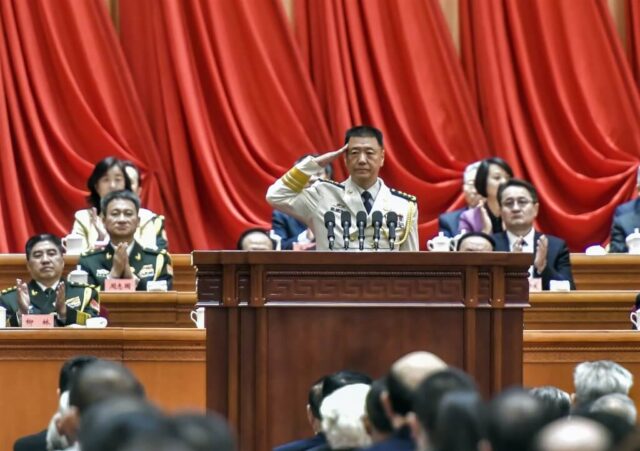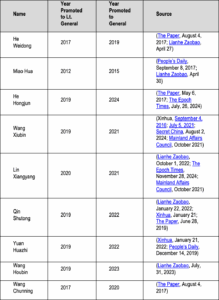Cronyism and Failed Promotions: Xi’s PLA Purge
By:

Executive Summary:
- The Ministry of National Defense announced on October 17 that nine generals—including Central Military Commission Vice Chairman He Weidong and Political Work Department Director Miao Hua—had been expelled from the Party and the military.
- The purge centers on personnel mismanagement and alleged job-related crimes, highlighting systemic corruption within the PLA’s political work and promotion system.
- Many of the officers shared prior service ties in the Eastern Theater Command area and the former 31st Group Army, forming an improper network around He and Miao.
- The campaign marks Xi Jinping’s most visible effort yet to tighten control over the PLA’s personnel system, raising the question of whom Xi can still trust within his own military ranks.
On October 17, the People’s Republic of China (PRC) Ministry of National Defense announced the results of investigations into nine generals. All were expelled from both the Communist Party and the military. The list includes vice chairman of the Central Military Commission (CMC) He Weidong (何卫东), director of the CMC Political Work Department Miao Hua (苗华), executive deputy director of the CMC Political Work Department He Hongjun (何宏军), executive deputy director of the CMC Joint Operations Command Center Wang Xiubin (王秀斌), commander of the Eastern Theater Command Lin Xiangyang (林向阳), former political commissar of the Army Qin Shutong (秦树桐), former political commissar of the Navy Yuan Huazhi (袁华智), former commander of the Rocket Force Wang Houbin (王厚斌), and former commander of the People’s Armed Police Wang Chunning (王春宁) (Xinhua, October 17).
This is not the first time that the authorities have announced investigations or disciplinary actions against these generals. For example, in June this year, the standing committee of the National People’s Congress announced the removal of Miao Hua from his position as a member of the CMC (Xinhua, June 27). But the connection between the purges has never previously been explained. Today’s announcement in effect confirms that He Weidong, Miao Hua, and others faced purges due to alleged factionalism and misconduct in personnel appointments.
Mismanagement of Personnel within the Political Work System
The statement from the Ministry of National Defense suggests that the nine generals were likely purged over personnel management and promotion issues. While other parts of the statement consistently mention all nine, He Weidong, Miao Hua, and He Hongjun appear to be the key figures. They are singeld out for “strict disciplinary action” (严肃查处).
The most specific charge listed in the statement is “serious job-related crimes” (涉嫌严重职务犯罪), indicating that this is likely the principal reason for the purge. Other parts of the statement refer to more general offenses such as seriously violating Party discipline, and those involving particularly large sums, that are extremely serious in nature, and that have caused extremely adverse effects.
The common link between Miao Hua, He Weidong, and He Hongjun, and the charge of “serious job-related crimes,” lies in the PLA’s personnel management system. He Weidong served as the CMC vice chairman overseeing personnel affairs, while Miao Hua and He Hongjun were the top two officials in the CMC Political Work Department, which manages personnel matters. In other words, problems in the evaluation and promotion of general officers appear to be the central issue (China Brief, April 11).
Improper Personal Network Led by Miao Hua and He Weidong
The removal of the nine generals is the most prominent case to date linked to the PLA’s broader personnel management problems. The nine appear to have formed an improper network centered around Miao Hua and He Weidong. Among them, Miao Hua advanced the fastest. He was promoted to general in 2015 and took over the CMC Political Work Department around September 2017, where he oversaw personnel management and promotions across the entire military until his suspension in November 2024. Except for He Weidong and Wang Chunning, who were promoted to lieutenant general in July 2017, the remaining six rose from the rank of major general to general during the period when Miao Hua oversaw personnel affairs. Table 1 below shows the promotion histories of the nine generals.
Table 1: Promotion Histories of the Nine Generals

Among the nine generals, seven previously served in the Eastern Theater Command area. Some, such as He Weidong, Miao Hua, and Lin Xiangyang, spent extended periods in the former 31st Group Army, now reorganized as the 73rd Group Army. This indicates a degree of geographic and operational overlap that likely fostered personal connections during training and exercises. He Weidong was promoted to general in 2019 and served as commander of the Eastern Theater Command until his reassignment in 2022. During that period, both Wang Xiubin and Lin Xiangyang served as deputy commanders of the Eastern Theater Command before being reassigned in 2021 to command the southern and central theater commands, respectively.
The two whose public records show no prior service in the Eastern Theater Command, Yuan Huazhi and He Hongjun, both had direct subordinate relationships with Miao Hua. During Miao’s tenure as political commissar of the Navy in 2014–2017, when he oversaw naval personnel affairs, Yuan served directly under him, holding positions as political commissar of the Naval Equipment Research Institute and later of the Marine Corps. After Miao became director of the CMC Political Work Department in 2017, He Hongjun continued to serve as one of his deputies and was later promoted in 2024 to executive deputy director along with his promotion to general.
Conclusion
The purge of these nine generals represents one of the most visible examples of CMC Chairman Xi Jinping’s ongoing effort to overhaul and tighten control over the PLA’s personnel management system. Xi aims to address the military’s long-standing problems in promotion and personnel oversight. This explains why political work and discipline within the PLA this year have placed extraordinary emphasis on personnel management (China Brief, May 23; October 17). Accordingly, the official statement released on October 17 explicitly noted that the purge of the nine generals once again demonstrates the firm resolve of both the Party Central Committee and the CMC to carry the anti-corruption struggle through to the end, and emphasized that corruption will find no shelter within its ranks.
The latest announcement signals the end of one set of investigations. The probes into senior generals that began with the CMC Equipment Development Department in 2023 appear to have reached a temporary pause following the disciplinary overhaul of political and personnel work—and the punishment of CMC vice chairman He Weidong, who oversaw these areas. But similar investigations and purges will likely continue in the foreseeable future. The key question is this: if Xi Jinping can no longer trust the confidants who came up with him in the old 31st Group Army in Fujian Province, who can he still trust?



